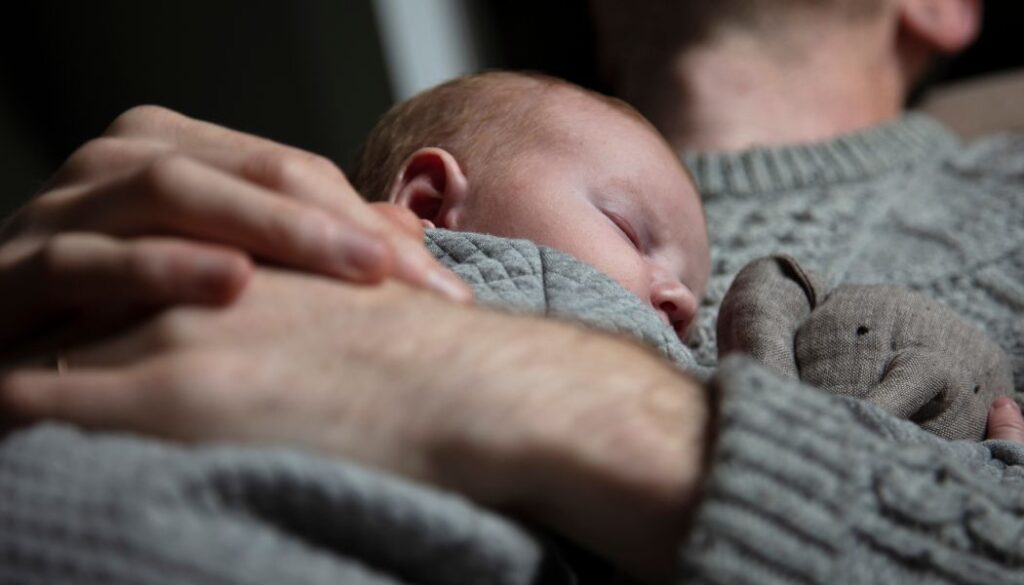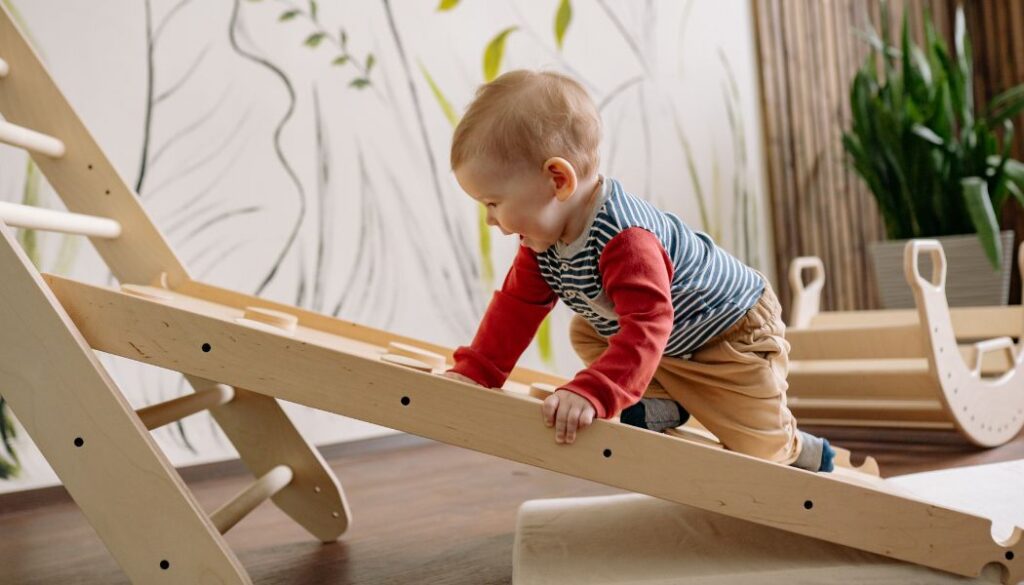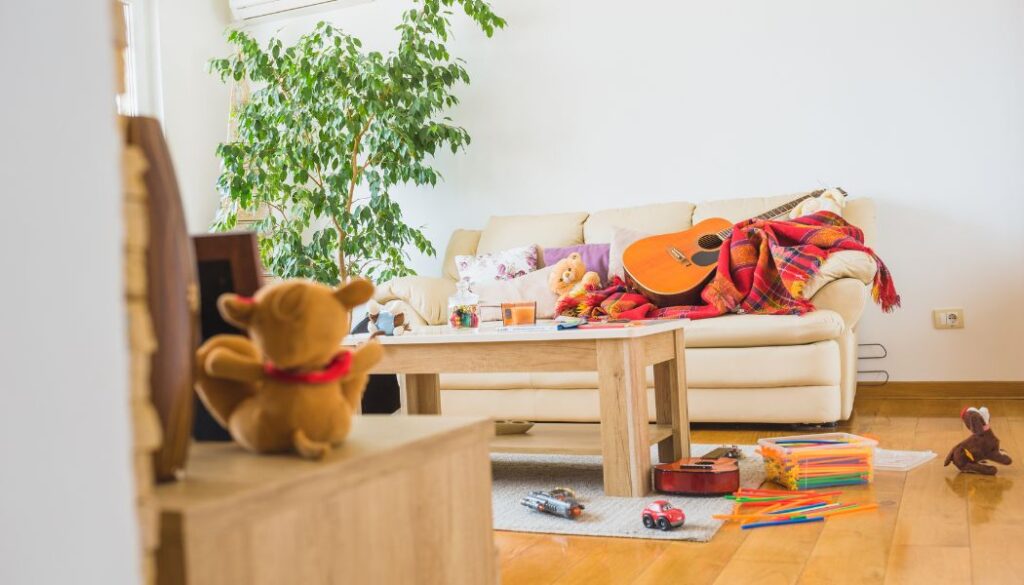This post shows you the essential parenting priorities that can help you make good decisions and choices for your newborn baby.
Before the baby comes, you need to discuss your parenting priorities with your partner.

Some parents want to do it all: track milestones, write everything down, create spreadsheets, and follow every single tip and guideline. I’m not saying it’s wrong (you superhuman!), but maybe, just maybe, you want to be careful not to burn out.
Talking about parenting priorities will help you bond with your partner and make you both feel like you’re contributing to this new chapter of your life 50-50.
Some parents rely on intuitive parenting and just go with the flow. Others like to plan and track everything. Whatever you decide to do, you need to make sure you’re 100% on the same page!
So, let’s start with some basic and simple parenting priorities.
Safe Sleep Environment
The number one priority (along with feeding) is a safe sleep environment. You two need to decide whether or not you’ll be co-sleeping, if the baby will be in their own room, and how you’re going to split your nighttime duties.
You probably know that the best and safest way for a baby to sleep is in a crib or cot, in your room, near your bed.
The baby needs a firm mattress and no plush toys, loose bedding, or crib covers.
The safest sleep position is on the back, although some midwives advise gently placing the baby on their side.
Talk to your healthcare professionals at the birth center, and make sure that both you and your partner agree! There’s no way you’re going to sleep well if one of you wants to try co-sleeping and the other thinks it’s unsafe.
Feeding & Nutrition
Along with sleep, feeding is one of the most essential parenting priorities when it comes to taking care of a baby.
I know that most people will say that breastfeeding is best, but I’m going to rephrase this and say that a happy mom and enough food (formula or breastmilk) are what’s best for the baby.
If you’re set on breastfeeding, I really suggest you start preparing months before you have your baby. My husband and I watched YouTube videos, read books, and discussed how he could help with breastfeeding.
It may sound silly, but he can help hold the baby while you focus on the latch. He can also learn how to do a proper massage, prepare cold and hot compresses for your sore boobs, and do a lot of other things!
You need to be on the same page because if breastfeeding is important to you and your partner sees that you’re struggling, it wouldn’t be very helpful for them to say, “Well, we’re just gonna give up and use formula instead.” That wouldn’t be helpful, right?
So whatever you decide, you need to work as a team here. Figuring out breastfeeding, formula, a feeding schedule, and everything else is a piece of cake if you two work as a team.
Figure Out Changing Diapers and Bathing

Skincare is a big part of newborn care, and it starts with gentle cleansing and proper bathing techniques.
In the first few weeks, you’ll need to give your baby a sponge bath and use cotton wipes instead of regular baby wipes until the umbilical cord falls off.
After that, you can start bathing the baby in a safe way, making sure the water temperature is just right, and making it a part of your daily or bedtime routine.
Bathing a newborn baby will feel so intimidating at first, but it’s not really rocket science, and you two can absolutely do it!
Along with bathing, one of the biggest parenting priorities for you two will be diaper changes.
Here, both you and your partner need to learn how to change a diaper, what to do with diaper rash, when to change sizes, and recognize what’s normal and what’s not.
Most of us really have no clue what’s normal and what’s not, but there are healthcare professionals, credible online sources, and lots of proven information online that can help you learn.
The key here is that both parents need to be on top of diaper changes and bathing! Weaponized incompetence has no place here, and if you even notice a slight signal that you may be dealing with weaponized incompetence, you need to react ASAP!
Monitor Baby’s Health
Baby’s health and doctor’s visits can’t fall entirely on the mom!
She shouldn’t have to be the project manager here and carry all the mental load. The emotional and mental load of a baby’s doctor’s appointments has to be shared!
Hopefully, you and your partner will be on the same page when it comes to modern medicine, vaccinations, doctors, and when to reach for help.
These conversations are essential to figure out before the baby comes, as the baby’s health will be one of the most important parenting priorities.
You don’t want to be debating whether a fever of 100°F warrants a call to the pediatrician.
I need to add here that it’s essential to set firm boundaries with extended family.
You’ll hear things like, “Back in my day, we did things this way, and everything was fine.” But times change, and science-backed medical advice should always come first.
Have a game plan here! Build up your confidence and support each other.
Create a joint calendar, schedule all doctors’ appointments in Google Calendar, and add each other. Help each other manage the workload, and you’ll be fine!
Learn Soothing Techniques

Whatever I write here, whatever you read, whatever you hear, nothing, I repeat, nothing will prepare you to handle a newborn.
But you should learn some soothing techniques as one of your parenting priorities. Soothing a baby is not just a mom’s job.
Babies cry for a lot of reasons, and learning how to calm them down will make a huge difference.
There’s breastfeeding, swaddling, rocking, using white noise, massages, gentle bouncing, and more! Just be consistent and patient.
Practice together and give each other breaks!
Build Secure Attachment

Babies need to feel safe and loved! That’s what secure attachment is about.
Both parents need to be “the go-to” parent, and this is true even if one of you is working outside the home! Maybe one of you will go to work, and the other parent will spend the majority of their time with the baby. BUT you both need to be able to comfort the baby!
Building a secure attachment can include skin-to-skin contact, letting babies feel your warmth, your smell, and your touch.
Babies don’t just need food and sleep. They need your love, and sometimes, that’s just your reassurance.
Talk to your partner about how you’re going to do this.
Some practical tips can include holding the baby after work, singing to the baby while you’re doing chores, taking turns responding to cries, and then building attachment together as a shared job.
Establish a Gentle Routine

Some parents rely on intuitive responses, and some like to stick to routines.
Almost all babies have to have routines. They are important for babies, but of course, you can still build them to be flexible.
Having a predictable routine can help you stay organized and plan your day. This will automatically reduce stress!
Of course, you need to be able to go with the flow, as babies will have different demands and different times, but you can establish a routine for feeding and sleeping schedules.
Dads need to be involved here, not just helping but actively participating in feeding, soothing, and bonding.
Routine isn’t about doing things one exact way. It’s about finding what works for your family while making sure your baby gets the care and comfort they need.
Encourage Early Communication
Talking, singing, swaying, stroking, and making eye contact with your baby might not make sense as your baby will mostly eat, sleep, repeat, and cry! But this is one of the most essential parenting priorities.
Babies learn to communicate by watching, listening, and interacting with you, both of you.
Then, after the initial phase, you need to encourage them to develop motor skills, to grab and hold things, and to have active and playful tummy time.
If one parent thinks, “This isn’t that important,” it won’t work. You both need to have the same attitude and be equally engaged in helping your baby learn.
Support Sensory Experiences

Newborns learn through their senses, and sensory experiences help them understand the world.
Simple things like soft music, gentle touch, and slow, soothing movements can stimulate their brain while keeping them calm and comfortable.
Both parents need to be on top of this. You should both make it a habit of letting your baby feel different textures, to play and move to different music, and to help them interact with the world.
Prioritize Your Recovery & Rest
Your baby needs care, and you do, too.
Postpartum is called the 4th trimester for a reason, and recovery takes time!
Rest is essential for you as a mom and for your partner. You need to take care of your physical and mental health.
Sleep when possible, and let go of certain expectations. Don’t push yourself to do it all.
Partners need to step up here. You didn’t have a baby alone, so you shouldn’t recover alone.
You need teamwork here, and you both need to prioritize recovery and rest. Let the dishes get dirty, leave the mess if you have to, and get some sleep.
Set Realistic Expectations

If you are a neat and tidy person, you need to forget perfection. Parenting can be messy and unpredictable.
Some days, your baby will need you all the time, and some days, they will sleep in their cot.
The sooner you let go of perfection and embrace flexibility, the easier it will be.
Focus on adapting and supporting each other instead of getting everything right and perfect.
Discuss Parenting Roles with Your Partner
Who does what? How will you share responsibilities?
One parent shouldn’t automatically be in charge of all the baby-related tasks while the other just “helps out.”
Don’t ever use terms such as “babysitting” or “helping out.”
When I hear, “Is your husband helping with the baby?” my response is always, “No, he’s not. He’s parenting.“
Figuring out our responsibilities will be one of the most important parenting priorities for you and your partner, and I assure you, you can definitely both be great and amazing parents!
Define Your Parenting Values
Every family has different priorities, and it helps to define yours upfront. What matters most to you? Responsiveness, structure, flexibility, routines, or free-spirited parenting?
If you’re feeling lost, start here! This guide will help you feel ready to define your parenting values before the baby comes!
You and your partner don’t have to agree on every detail, but you should align on the big things like discipline, screen time, and lifestyle changes!
Have these discussions early!
Establish Boundaries with Visitors

The moment your baby arrives, so do the visitors.
While it’s super nice to see people you love, you need to set up some boundaries and decide who can visit and when. How often do both parents need to be on the same page?
Some people mean well but overstep boundaries with unsolicited advice (“Just let the baby cry it out!” or “Why don’t you give them some real food?“).
Others might assume they can drop by unannounced.
Some people will ask you to come, clean your house, buy your food, and tell you that you’re doing an awesome job!
Decide together what’s okay and what’s not, and don’t be afraid to set firm, clear limits.
Plan for Self-Care & Mental Health
Parenting is exhausting, and burnout is real. Taking care of yourself isn’t selfish, it’s necessary. You can’t pour from an empty cup.
It’s essential to make this one of your parenting priorities.
Make a plan to check in on each other’s mental health.
Take breaks and get help when needed.
For example, even before we had a baby, I knew that I wanted to hire a lactation consultant to help me. I planned this in advance. I also knew that I would like visitors, but only after my wound had healed a bit, so I didn’t want anyone other than my husband and my dog in the first couple of weeks.
It’s important to learn how to decompress. It’s important to be in tune with your emotions.
Both parents need space to recharge. And supporting each other is the best way to take care of your mental health.
Essential Parenting Priorities
- 1. Safe Sleep Environment
- 2. Feeding & Nutrition
- 3. Figure Out Changing Diapers and Bathing
- 4. Monitor Baby’s Health
- 5. Learn Soothing Techniques
- 6. Build Secure Attachment
- 7. Establish a Gentle Routine
- 8. Encourage Early Communication
- 9. Support Sensory Experiences
- 10. Prioritize Your Recovery & Rest
- 11. Set Realistic Expectations
- 12. Discuss Parenting Roles with Your Partner
- 13. Define Your Parenting Values
- 14. Establish Boundaries with Visitors
- 15. Plan for Self-Care & Mental Health
If you’re reading this while planning for a baby or while pregnant, I suggest you do some soul-searching and work on your self-care plan. I can vouch for this — it’s not a solo trip. You should do this together.
THESE are the conversations you should have first. Don’t miss this.
These conversations are all part of the Pre-Baby Talk. That’s why, when the baby comes, you’ll be ready and prepared for…
…all the love in the world.
Which of these parenting priorities do you think are the most important? Let me know in the comments!
Don’t forget to pin this post so you’ll always have these tips handy!
This post showed you Essential Parenting Priorities: How to Make the Best Choices for Your Newborn.
You may also like:
Leave a Reply